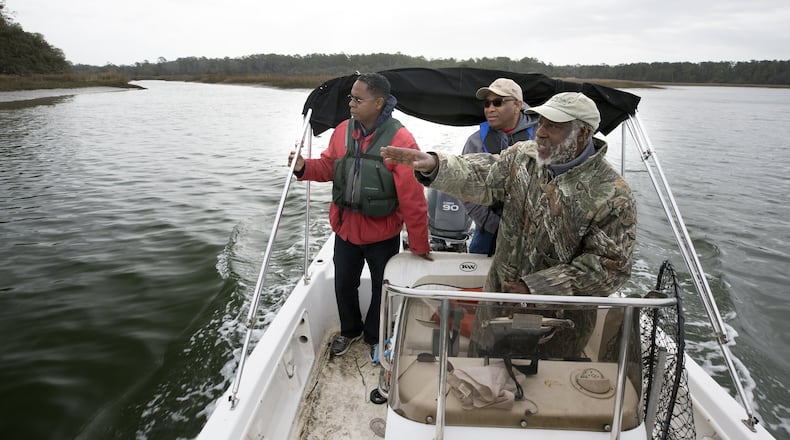Sometimes it takes an outsider to draw attention to something that’s been obvious the whole time.
That’s what locals say about their newfound desire to change the name of Runaway Negro Creek.
Savannah natives say they’ve grown up knowing about the existence of the creek, which runs along the edge of Skidaway Island State Park and sometimes serves as a shortcut boaters use to get around the winding Skidaway River.
“It’s always been a part of life in this area,” said Jamal Touré, a local historian who leads African-American history tours and teaches Africana studies at Savannah State University.
Touré says the creek is named after slaves from the Modena Plantation on Skidaway Island who would escape and try to cross the water to Union-occupied coastal islands along the river during the Civil War.
It wasn't until one of his friends, who did not grow up in the Savannah area, asked state Sen. Lester Jackson, D-Savannah, why the name hadn't yet been changed that the legislator began thinking about how some could find it jarring.
Locals who find out about the creek are surprised by its name.
“Oh, God,” said Maia Wright, a 20-year-old Savannah resident who said she’d never heard of the creek before. “There’s the history in the history books, and then there’s history that’s left out of the history books.”
Seeing it through the eyes of an outsider, Jackson said he believes the time has come to change what some consider an offensive name.
He recently introduced bipartisan legislation that would encourage state officials to urge the United States Board of Geographic Names to change the name of the body of water to Freedom Creek. The board is tasked with maintaining uniform usage of geographic names across the country.
That proposal, Senate Resolution 685, received initial committee approval last week.
Senate Majority Leader Bill Cowsert, R-Athens, who co-sponsored the measure, said he understands how many find the name offensive.
“Out of sensitivity to those concerns I felt like it was a fair thing to do,” he said.
The shallow creek, surrounded by marsh, snakes its way down from a curve of the Skidaway River near Isle of Hope to a spot further south on the same river. When the tide is high, boaters use the cut-through to avoid having to adhere to the Isle of Hope Marina’s no-wake zone.
Some find the word “Negro” itself to be insensitive, but Touré said he’s more concerned with the connotation “runaway” brings — that the slaves, as property, were acting criminally.
“What this is about is bringing humanity to those people and taking that term ‘runaway’ to the next logical step,” he said. “What were they seeking? They were seeking freedom.”
Hanif Haynes, a local historian who works with the Pin Point Heritage Museum, said he thinks it’s possible the federal government will change the name. After all, he said, it’s been done before.
It’s difficult to determine exactly when the change occurred, but references to “Runaway Nigger Creek” are found in The Savannah Morning News in the late 1800s. Haynes, 63, said he even once had a map with the original name marking the waterway.
“Someone decided that name was too offensive and it got changed,” he said.
Cowsert said he thinks a formal request from Georgia officials could assist the name-change process.
“Naturally, they’re not bound by any of our recommendations,” he said, “but it’s good for the federal government to know the feelings of the people of Georgia.”
Jackson held a town hall meeting in Savannah last summer where he said many attendees not only urged he work to change the name, but demanded it.
Wright, the 20-year-old Savannah resident, said it was time for the name to go.
“They should take that very offensive and terribly associated history (of Runaway Negro Creek) and name it something that highlights a better part of history and not the tragic part,” she said.
While on a boat tour of the creek with Touré last week, Jackson stressed that his intention is to have a more full and accurate portrayal of the Savannah-area’s history.
“It’s not about trying to erase history,” Jackson said.
Touré added: “It’s about trying to correct it.”
About the Author
Keep Reading
The Latest
Featured



